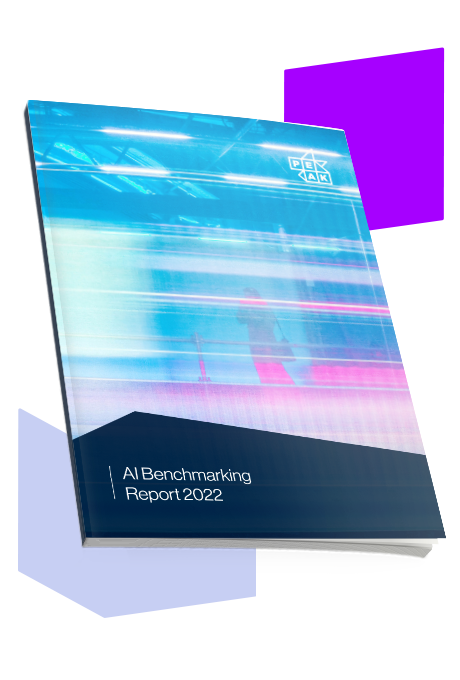Peak's AI Benchmarking report
Peak’s AI Benchmarking Index, developed in partnership with the Center for Economics and Business Research (Cebr), recognizes that the path to AI adoption is more nuanced than current AI maturity models suggest.
How should we measure adoption of AI?
Artificial intelligence is already becoming a powerhouse, and changing the way we work. But how close are we to mass adoption of AI? Across two surveys we asked 6,000 employees from across India, the US and the UK. Below is a selected analysis of what they told us.
Introducing Peak’s AI Benchmarking Index
Peak’s AI Benchmarking Index, developed in partnership with the Center for Economics and Business Research (Cebr), recognizes that the path to AI adoption is more nuanced than current AI maturity models suggest.
The AI Benchmarking Index aims to capture this nuance by providing an Index score of 0 to 100. The Index is underpinned by a framework of pillars, each of which gauge a business’ readiness for AI from different perspectives:
- Decision Making
- Strategy
- Data & Technology
- People & Process
- Value & Measurement,
The AI Benchmarking Index draws on a large international survey of 3,000 senior decision makers, and 3,000 junior staff from businesses with at least 100 employees across the US, UK and India.
The report contains the full methodology and criteria, but below you can read some key findings from the report.

81% say AI will play a major or moderate role in their businesses achieving its objectives in the next five years.

72% say junior staff are supportive of AI.

84% have a formal data storage system.

95% have or intend to implement a data strategy.
Despite some positive signs that AI adoption is accelerating, there are still some hurdles and challenges to overcome:

Only 35% of data strategies include provisions for AI.

Just 37% of junior staff are aware of AI projects in their business.

Only 42% of businesses have data scientists.

23% of junior staff think AI will have a negative impact on employment.
India ahead across most measures
Indian companies scored an average of 64/100 in our Index, followed by the US on 52/100, with the UK trailing on 44/100.

Most companies sit in the Optimization stage of the AI Benchmarking Index
This shows the mean percentage of businesses at each stage of the AI Benchmarking Index by region.


Decision Making
Learning how to leverage AI in commercial decision-making is essential to the successful adoption of the technology long-term.
Indian businesses benchmark 64/100 on average, compared to 45/100 for the UK. The US firms fall in the middle of the two with an average score of 51/100.

Strategy
The Strategy pillar seeks to benchmark a number of complementary strategic pieces that must align to ensure successful AI adoption.
We noted the highest average score across all three countries on the Strategy pillar. Mean scores on the pillar range from 60/100 in the UK to 80/100 in India, with an overall average of 69/100.

Data and Technology
The Data and Technology pillar captures the types of data created by an organization and how it is structured, as well as the applications used to collect and store data, visualize insights or make commercial decisions.
Maturity across all businesses surveyed was high for Data and Technology, with a mean average of 62/100.

People and Processes
As with any transformative technology, the successful adoption of AI is reliant on the support of end users throughout the organization.
The average benchmarking score on this pillar was 49/100 for the businesses surveyed. 96% of businesses surveyed had attempted at least one digital transformation project over the last five years, with an average of 8.5 attempted globally during that time.

Value and Measurement
Currently, only a quarter of commercially-built AI models are ever deployed.
The majority of businesses currently using AI (63%) still measure the value of AI against non-financial metrics. The most frequently used measure of value is simply the number of AI projects undertaken — 41% use this measure all the time despite the fact that it provides no real assessment of whether a project was ultimately successful.
AI Benchmarking scores vary by industry
Irrespective of region, size or age, businesses within the IT, computing and technology industry have the highest benchmarking scores of all those surveyed, with a score of 62/100. Manufacturing ranked third highest with a score of 53/100. Education scored lowest with a score of 37/100 Education scored lowest with a score of 37.

